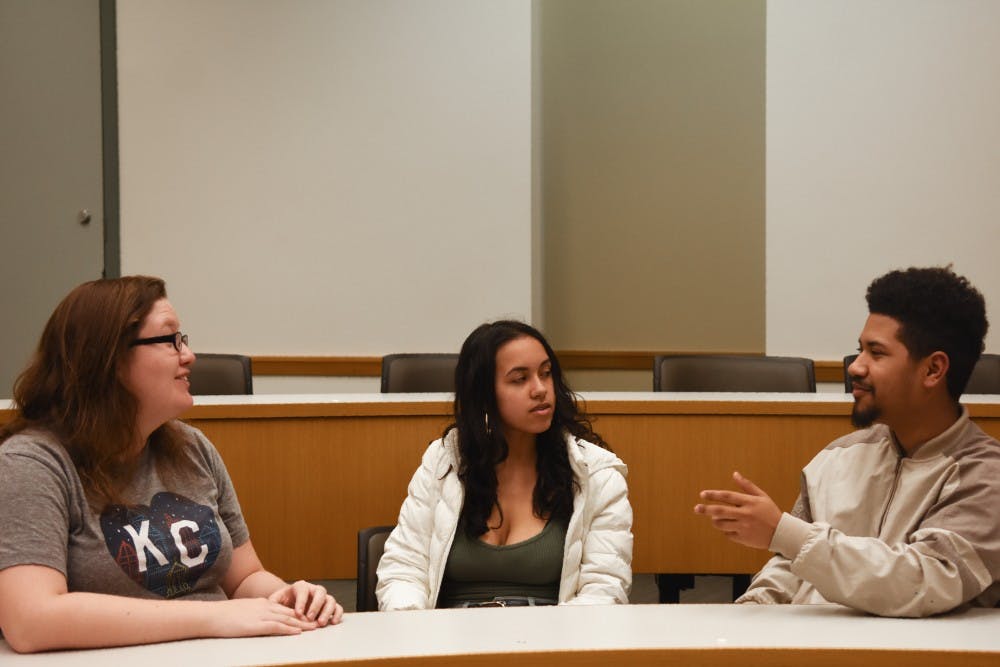As the national college admissions scheme continues to unravel, some first-generation, low-income students say they are frustrated with the "unfair" admissions process of elite institutions.
On March 19, Penn First, the largest FGLI student group on campus, hosted their monthly town hall with a focus on college admissions. At the event, students discussed how the role of legacy admissions benefits the wealthy and how they see criticism of affirmative action as misguided.
Last week, a national bribery scam exposed more than 50 famous actors, athletic coaches, and university administrators for cheating on entrance exams and bribing college officials to get prospective students admitted into elite colleges. Penn First Advocacy Chair and College senior Lyndsi Burcham said the group planned the event in fall 2018, long before the scandal broke, to address growing conversation about the fairness of college admissions.
College sophomore Jordy Atencia said criticizing affirmative action is "hypocritical" when influential people, including those involved in national admissions scandal, can afford to bribe coaches or admissions officers and leverage their power illegally.
News of the national admissions scandal came only days after the testimony of former Penn basketball coach Jerome Allen, who admitted to receiving $300,000 in bribes to help a current Wharton senior gain admission to the University by falsely listing him as a recruit. Penn Dean of Admissions Eric Furda has since said the University will consider revising its processes related to recruitment and evaluation in response to the Allen scandal.

Attendees of FGLI town hall discussed the academic resources that more wealthy families can easily access – including prestigious high schools, private SAT tutoring, and social capital. (File Photo)
“It’s so funny how people have always used that as an argument for why underrepresented students shouldn’t be at institutions like this," Burcham added. "[Critics] think they got here in an unfair way, and yet there are privileged students getting here in unfair and illegal ways."
These arguments against affirmative action contribute to feelings of "imposter syndrome" that FGLI students feel on Penn's campus, Penn First communications chair and Wharton sophomore Maribel Davila said.
“A lot of us feel that we don’t belong here and that because of our economic situation, we were just chosen because we were minorities or of a lower economic status,” Davila said.
In response to the claim that affirmative action allows less academically-qualified students to gain admission into elite universities, the attendees highlighted the academic resources that wealthier families have access to, including prestigious high schools, private SAT tutoring, and social capital.
“It’s like a slap in the face, almost, to be told that we may have taken spots from students who were better or had better scores, but in reality it was because they had more money,” Davila said.
Students also pointed to the connections that non-FGLI students at Penn might have, from college-educated parents to using student networks to access practice midterms.

Engineering sophomore May Xiao.
"Legacy admissions was a topic I never thought of before," Engineering sophomore May Xiao said after the event. "But just knowing some people at Penn, and the reason for Olivia Jade’s scandal, I think it’s a result of a lot of toxic culture among the wealthy – the pressure to feel like 'our kid needs to go to an elite school to uphold an image.'"
Burcham said more checks need to be set in place across all universities to prevent bribery and cheating on college applications. She added that the news surrounding these scandals made her feel as if her accomplishments at Penn are more validated.
"It is really uplifting to know I got to the same place having gone through so much more,” Burcham said. “It’s a hard thing to grapple with to figure out how I feel exactly, because it makes me feel proud of myself but also, wow, my life could have been so much easier.”
When asked about why the scandals matter to her, Burcham reflected on her own admissions process.
“I worked so hard to get here and there are people getting to the exact same spot without having done anything and it makes me feel like, if I had been lucky enough to be in a situation like that, I wouldn’t have gone through so much trauma and hardship to get where I am now,” she said.









